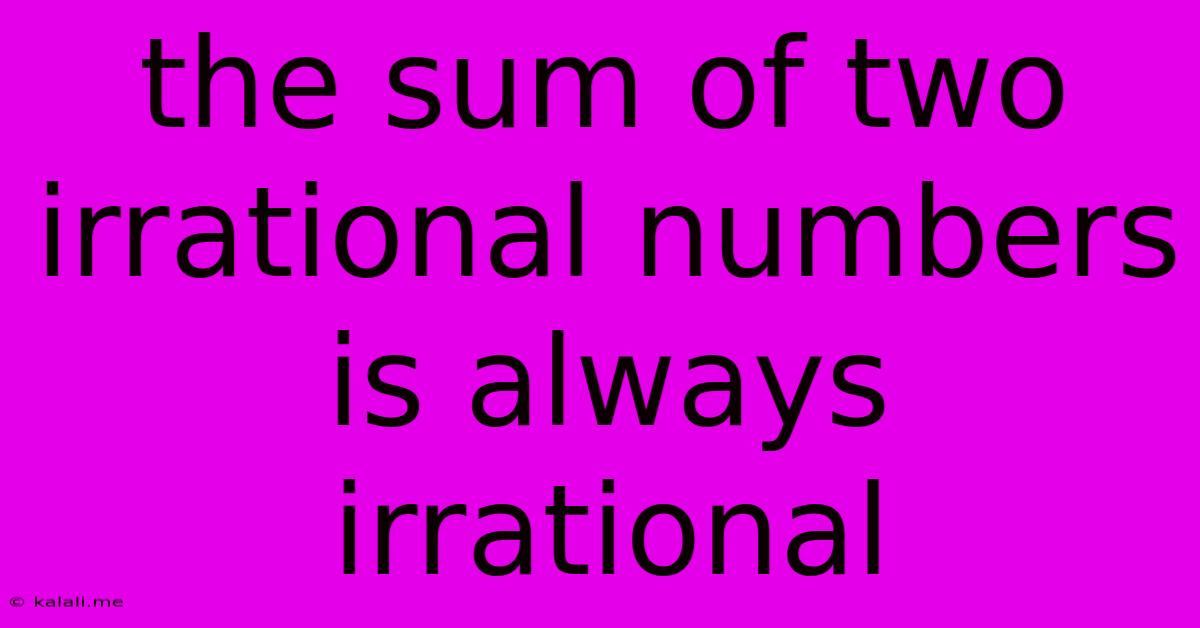The Sum Of Two Irrational Numbers Is Always Irrational
Kalali
Jun 14, 2025 · 2 min read

Table of Contents
Is the Sum of Two Irrational Numbers Always Irrational? A Deep Dive
Meta Description: Explore the fascinating world of irrational numbers. This article delves into the question: is the sum of two irrational numbers always irrational? We'll examine the proof, counter-examples, and explore related mathematical concepts.
The question of whether the sum of two irrational numbers is always irrational is a deceptively simple one. Intuitively, one might assume the answer is yes. After all, irrational numbers, by definition, cannot be expressed as a ratio of two integers. Adding two such numbers seems unlikely to magically produce a rational number. However, mathematics often surprises us, and this is one such case. The answer is no, the sum of two irrational numbers is not always irrational.
Understanding Irrational Numbers
Before we dive into the proof, let's solidify our understanding of irrational numbers. These are real numbers that cannot be expressed as a fraction p/q, where p and q are integers, and q is not zero. Famous examples include π (pi), approximately 3.14159..., and √2 (the square root of 2), approximately 1.41421... These numbers have infinite non-repeating decimal expansions.
The Counter-Example: Proving the Statement False
To disprove the statement "the sum of two irrational numbers is always irrational," we only need to find one counter-example. Consider these two irrational numbers:
- a = √2
- b = -√2
Both a and b are irrational. However, their sum is:
- a + b = √2 + (-√2) = 0
And 0 is clearly a rational number (it can be expressed as 0/1). This single counter-example effectively demonstrates that the initial statement is false.
Exploring Other Combinations
While the above example clearly refutes the initial claim, it's worth exploring other possibilities. The sum of two irrational numbers can be irrational. For instance:
- √2 + π is irrational. There's no known way to express this sum as a fraction p/q.
The key takeaway is that the outcome depends entirely on the specific irrational numbers being added. There's no general rule guaranteeing an irrational result.
Related Mathematical Concepts
This exploration touches upon several important mathematical concepts:
- Rational Numbers: Numbers that can be expressed as a fraction p/q (where p and q are integers and q ≠ 0).
- Real Numbers: All numbers on the number line, including rational and irrational numbers.
- Proof by Counterexample: A method of disproving a statement by showing a single instance where it is false.
Conclusion: The Nuances of Irrational Numbers
The seemingly straightforward question of whether adding two irrational numbers always results in an irrational number highlights the subtle complexities within mathematics. While intuition might suggest a positive answer, the existence of counter-examples, like √2 + (-√2) = 0, proves that this isn't universally true. The outcome is highly dependent on the specific irrational numbers involved. This exploration underscores the importance of rigorous mathematical proof and the need to move beyond intuition when dealing with abstract concepts.
Latest Posts
Latest Posts
-
Which Of The Following Statements Is True About Ions
Jun 15, 2025
-
Who Wrote Sare Jahan Se Achha
Jun 15, 2025
-
Which Solution Is The Most Acidic
Jun 15, 2025
-
How Many Players In A Hockey Game
Jun 15, 2025
-
Is Stainless Steel A Homogeneous Mixture
Jun 15, 2025
Related Post
Thank you for visiting our website which covers about The Sum Of Two Irrational Numbers Is Always Irrational . We hope the information provided has been useful to you. Feel free to contact us if you have any questions or need further assistance. See you next time and don't miss to bookmark.